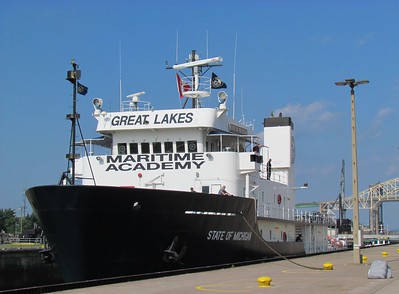Last fall, Northwestern Michigan College (NMC) announced a new two-year degree program – Water Quality Environmental Technology. The program will prepare students to work in water quality fields and clean up contaminated water. It is noble work, and Michigan has a lot of contaminated water. So do a lot of other places. Undoubtedly, the graduates of this program will be in high demand no matter where they end up working.
If you’ve never been to NMC, you should go sometime. The campus is right on the water, and NMC has several exceptional programs. They include the Great Lakes Maritime Academy, which prepares students for a maritime career. If you stop by the Hagerty Center for a visit, you may be able to see the pilot house simulator NMC uses to train students to pilot ships. Students in the maritime program learn to pilot both Great Lakes freighters (“lakers”) and ocean-going vessels (“salties”). The program has the distinction of having every single graduate employed in their field of study.
The Great Lakes Culinary Institute is fabulous and has an unbeatable view overlooking Grand Traverse Bay. (Trivia time: for a long time, NMC was the only Michigan community college with a permanent liquor license. OCC was recently granted one for its new culinary institute.)
And there’s the Great Lakes Water Studies Institute, which will house the new Water Quality Environmental Technology Program. The director, Hans Van Sumeren, has worked in the area for a long time, first as a research scientist at the University of Michigan, and more recently as the Director of the Water Studies Institute. (I first encountered Hans about 20 years ago (maybe more?) when he was deploying research buoys in Lake Michigan in the summer months.)
Two-year degree programs could give Michigan a lift
Every single county in Michigan deals with water quality issues. PFAS and PFOS contamination affects virtually the entire state. Pipeline leaks and chemical contamination are commonplace. (e.g., the 1,4 dioxane plume from the old Gelman Sciences site). Having trained technicians to deal with water contamination is exactly what the state needs. (There are dozens of similar environmental disasters all over the state just waiting to be discovered.) And the Water Quality techs that NMC graduates will be both well paid and in high demand.
These are the kinds of innovative two-year degree programs that Michigan community colleges can produce, when they have dedicated, engaged faculty and administration who are focused on their institution’s instructional mission.
Beyond being engaged in simple “workforce development,” they’re engaged in research, and in training students to fill the jobs the area needs and wants. In 2022, NMC issued nearly twice as many bachelor’s degrees (38) as it did non-degree certificates (22). Additionally, NMC issued twenty-five times more two-year degree credentials than non-degree certificates.
On the other hand, WCC issued 1.39 times as many non-degree short term certificates as it did associate degrees. So, where are WCC’s innovative two-year degree programs that route people into high-wage work? How is WCC creating the workforce Michigan needs now and will need in the future?
Photo Credit: US Army Corps of Engineers, via Flickr






























